WORKFARE POLICIES AND WELFARE STATE LEGITIMACY
11-12 September 2008
Conference organised by the Nordic Centre of Excellence NordWel and
Stein Rokkan Centre for Social Studies
Nygårdsgtaten 5, 5015 Bergen
CONFERENCE THEME
A common trend in the welfare policies of many European countries is the increase in measures targeted at ‘high risk’ groups, such as the long-term unemployed. These policies can be seen as a reaction to problems related to an increasing differentiation in the labour market, problems related to long-term unemployment and to the growth of immigrant groups.
The political answers to this problem have been similar all over the Western world. The general trend of the reforms have been towards ‘active measures’ rather than passive, ‘sanctions’ rather than positive incentives, ‘duties’ rather than rights. These are key elements in a ‘new welfare contract’ between the citizen and the government, saying that ‘high risk’ recipients groups have to meet certain participation requirements in order to receive welfare benefits. This trend implies i.a. a move from universal welfare programs and services, to selective, means-tested ones.
This conference puts focus on those types of policy measure that can be summarized under the term of ‘workfare’. This literally means ‘work-for-your-welfare’, but should here include all kind of policies that involve certain participation requirements of the welfare recipients.
The aim of conference is to approach the question of the effects of workfare policies on welfare state legitimacy from various perspectives and regarding different policy levels:
- the normative level (general values guiding welfare policies, social policy ‘goals’ in the different countries),
- the structural or systemic level (including the specific organisational structures for realizing workfare policies, the role of workfare policies in relation to other social policy measures and their role in the changing modes of social and economic regulation), and
- the level of workfare policy practices (the implementation of workfare policies), as well as the level of outcomes of measures taken.
PROGRAMME
Thursday 11 September
10.00 Opening of the conference
Professor Helena Blomberg-Kroll (University of Helsinki)
10.15 From varieties of de-commodifying Keynesian welfare states to varieties of re-commodifying Schumpeterian workfare regimes
Professor Bob Jessop (Lancaster University, UK)
Discussion
11.30 The Normative Charges of Work in the Nordic Notions of Society
Professor Pauli Kettunen (University of Helsinki)
Discussion
12.30 Lunch
13.45-17.00 Two parallel workshops
Seven papers will be discussed
Friday 12 September
9.00 Towards a Re-assessment of Workfare. Tracing Recent Developments of Workfare and Activation
Professor Ivar Lødemel (Oslo University College)
Discussion
10.15-12.00 Three parallel workshops
Six papers will be discussed
12.00 Lunch
13.15 The New Contract and Incentive Thinking in Social Policy
Senior Research Fellow Nanna Kildal (Stein Rokkan Centre for Social Studies)
Discussion
14.30 Closing of the conference
REGISTRATION
Registration for the conference is free. The registration should be sent to
Nanna Kildal, nanna.kildal@rokkan.uib.no, by 8 August 2008.
ORGANIZING COMMITTEE
Nanna Kildal, Stein Rokkan Centre for Social Studies, Bergen
Pauli Kettunen, University of Helsinki
Helena Blomberg, University of Helsinki
This conference is part of the activities of the Nordic Centre of Excellence: The Nordic Welfare State – Historical Foundations and Future Challenges (NordWel) and it is organized by theme groups The Value Systems and Legitimacy in the Nordic Welfare State Model and The Normative Charges of Work: The Labour Market and the Welfare State.
